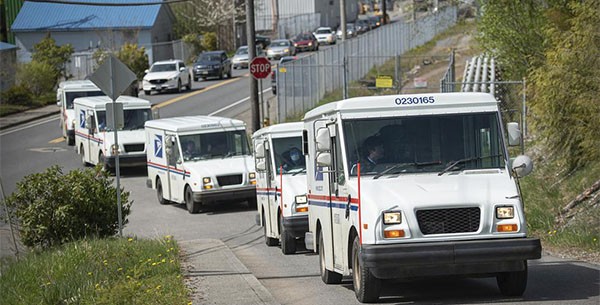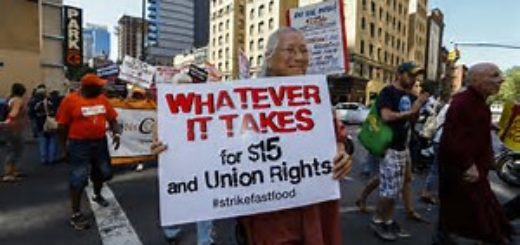Donald Trump’s Evil Plot to Destroy the Post Office

With all this talk about ‘heroes,’ it is the postal worker who stands tall.
Neither snow nor rain nor heat nor gloom of night stays these couriers from the swift completion of their appointed rounds.
Slogan on Farley Post Office Building, NYC
I cannot imagine a more crucial time when Americans depended on their post office. With an invisible, highly contagious virus forcing millions of Americans into their homes, the reliable flow of cards and letters from loved ones, checks and essential food and medicine are a lifeline that only one entity is uniquely qualified to render.
The United States Postal Service is the most trusted federal office in America, with an approval rating of 90%. Our founding fathers made good on their promise that the steadfast delivery of information would be a cornerstone of our democracy.
In 1775, the Continental Congress instructed Benjamin Franklin to fashion a postal delivery system for the 13 colonies. At the dawn of our nation, President Washington and James Madison secured Congress’s approval for a national system of post offices and postal roads. Home delivery began during and after the Civil War. President Lincoln preferred letter carriers to be wounded war veterans, who were grateful for the work.
As the New York Times put it, “The Postal Service is the most American thing we’ve got.”

How Did a National Treasure Become a Political Football?
Along with the VA, the US Postal Service seems to have Republicans salivating at the prospect of privatization. I suppose the thought of stripping 64,000 employees of their union would be enough for Republicans to be dancing to those Big Lebowski fantasy sequences.
The George W. Bush administration and a lame-duck Republican Congress struck a blow in 2006 when they passed a law requiring the US Postal Service to prefund 75 years worth of retiree health benefits in the span of 10 years. Cost was estimated to be $10 billion. Struggling mightily to make the payments, the post office began careening toward bankruptcy. The concept was mean-spirited and nonsensical considering that even well-off companies carry hefty unfunded pension liabilities.
COVID Stimulus Package Stiffs Post Office
The coronavirus-relief CARES Act refused to provide the necessary emergency appropriation to the post office…a national treasure that was never supposed to be profitable. Instead, the Act dispensed a $10 billion line of credit, with Treasury controlling the purse strings. Without this line of credit, the post office would go out of business.
Trump has vowed to block the line of credit approved by Congress unless the Postal Service raises its shipping rates. It is said that Trump’s motivation, aside from preventing absentee ballots and thus enhancing his election chances, is about Amazon’s shipping rates, but more specifically, about Amazon boss Jeff Bezos, who happens to owns the Washington Post, a leading part of Trump’s deranged “deep state conspiracy.”
Let’s set aside for the moment the unfathomable spectacle of the president of the United States trying to prevent mail-from-home electoral ballots amid a deadly pandemic. It is beyond words.
Concerning Amazon’s shipping rates, Trump, sure enough, has a point. Amazon and all rival e-commerce companies take advantage of the US Postal Service’s universal infrastructure to every single mailbox in America for what is called “last mile” service. The US Postal Service was the first and carved out all of those hard-to-reach residences that Amazon, et. al. basically co-opted as their own shipping network.
The situation is similar to a local broadcaster’s “rip and read” of a newspaper’s painstaking work product.
Cutting Off Your Nose to Spite Your Face
Trump seems not to have figured this out. If the USPS raises its shipping rates (incredibly, it’s feeling the pressure and thinking about it), the ripple effect will raise prices for all items ordered online. As weary (and increasingly unemployed) Americans rely more and more on package delivery, the last thing we need is a price war. It is a no-win situation, just like that other war with tariffs.

“This Crony Doesn’t Cut It!”
There’s a new postmaster general in town. No, not the man pictured above. Ronald Stroman, deputy postmaster general, a 42-year veteran of the USPS and an independent voice for postal reform, would have been the obvious choice. The circumstances of Stroman’s departure cannot be confirmed.
The job was handed to a one Louis DeJoy. He is the CEO of a North Carolina firm called New Breed Logistics, whose portfolio includes labor analytics…“the art of eliminating as many jobs as possible.”
DeJoy has no institutional knowledge of the Postal Service. He is known to be a generous donor in Republican circles, having recently donated $1.2 million to the Trump Victory Fund. Coincidentally or not, the Republican convention will be held in Charlotte, NC, where DeJoy will have a senior fundraising position.
Opposition and Hope
The reaction to DeJoy’s appointment was predictably furious and partisan. “The Postal Service is in crisis and needs real leadership [from] someone with knowledge of the issues,” Congressman Gerry Connolly (D-VA) told Fortune magazine. “This crony doesn’t cut it.”
Congressman Emanuel Cleaver (D-MO), a long-time advocate of the post office, nailed Trump’s rationale but struck a hopeful note. “I quickly realized that the president is irrepressible in his move to destroy the USPS,” Cleaver said, “with the clear purpose of dismantling it.
“This is a nail [in the coffin], but I don’t think it’s the final nail because I think there are Republicans who are not going to stand for this…History will fault all of us who remain silent right now.”
















































































































